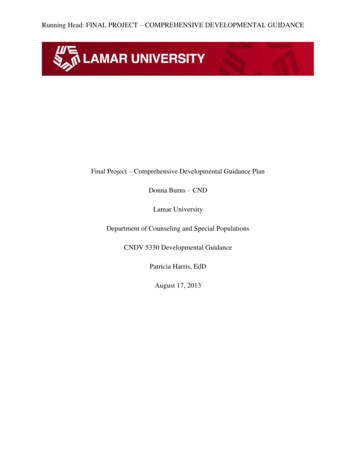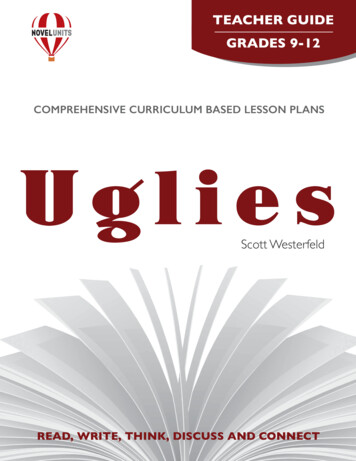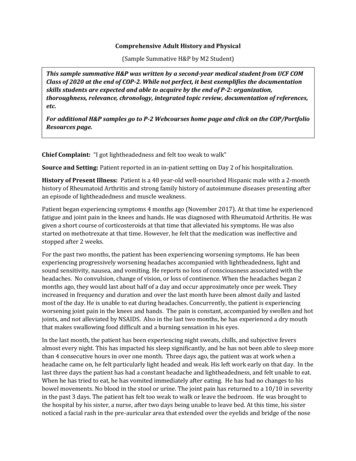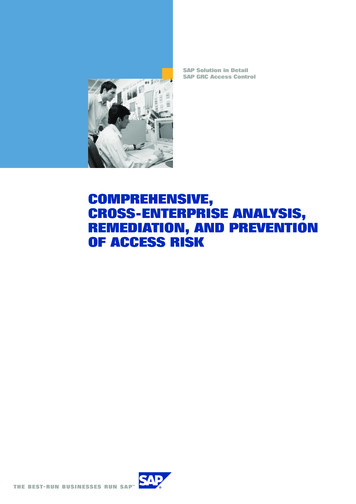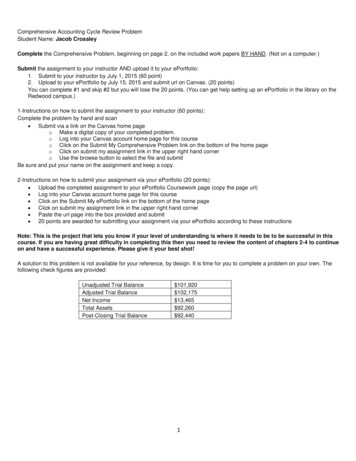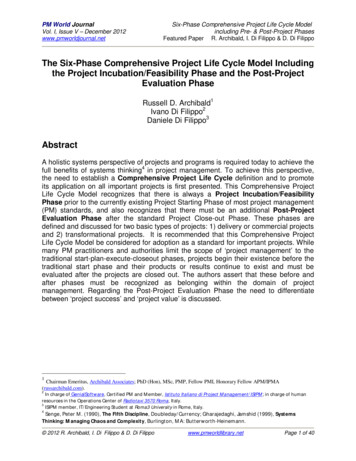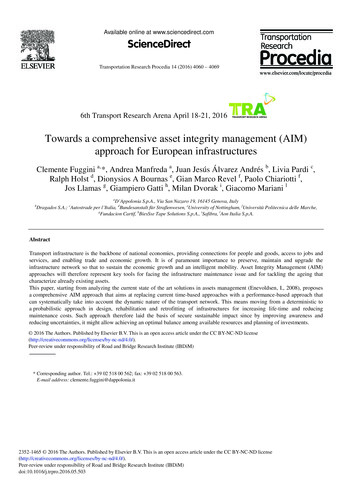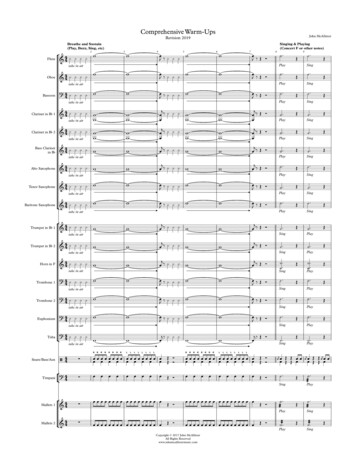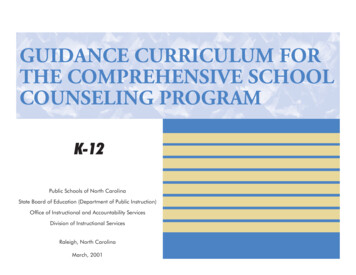
Transcription
GUIDANCE CURRICULUM FORTHE COMPREHENSIVE SCHOOLCOUNSELING PROGRAMK-12Public Schools of North CarolinaState Board of Education (Department of Public Instruction)Office of Instructional and Accountability ServicesDivision of Instructional ServicesRaleigh, North CarolinaMarch, 2001
TABLE OF CONTENTSSECTION TOPICPAGE1Foreward . 3Acknowledgements . 4Using the Curriculum Guide . 5Comprehensive School Counseling Guidance Curriculum Blueprint . 6School Guidance Counseling Connection . 7National Standards for School Counseling Programs . 8School Counseling National Standards . 9Rationale for a Guidance Curriculum in the School Counseling Program . 10Guiding Assumptions Of School Counseling Programs . 11School Counselor Roles and Functions . 12Role of School Personnel and Community in a Comprehensive School Guidance and Counseling Program . 13School Counseling Program Components . 14IICurriculum Lessons:Elementary Grades Blueprint for Elementary School Guidance Curriculum . E15-E18 Academic Development . E19-E36 Career Development . E37-E69 Personal/Social Development . E70-E104Middle Grades Blueprint for Middle School Guidance Curriculum . M105-M111 Academic Development . M112-M178 Career Development . M179-M221 Personal/Social Development . M222-M296High School Blueprint for High School Guidance Curriculum . H297-H303 Academic Development . H304-H393 Career Development . H394-H482 Personal/Social Development . H483-H557IIIResources and Appendix Academic Development . R558-R566 Career Development . R567-R571 Personal/Social Development . R572-R575 Assessing Needs and Evaluating Programs . R576 Delivering the Guidance Curriculum for the NC Comprehensive School Counseling Program . R577-R579 Comprehensive School Counseling Program Self-Assessment Scale . R580-R582 Implementation Review . R583 Template . R5842
FORWARDThe comprehensive school counseling program refers to a sequential, developmental program designed to benefit all students inpreparation for their futures. Such a program includes a curriculum organized around three areas essential for students’ growth anddevelopment: Academic Development, Career Development, and Personal/Social Development.1234Demonstrate a positive attitude toward self as a unique and worthy person.Gain life-planning skills that are consistent with their needs, interests, and abilities.Develop responsible social skills and an understanding and appreciation of being a contributingmember of society.Demonstrate an understanding and appreciation of the life-long process oflearning, growing, and changing.Activities and strategies for achieving identified student outcomes in these three areas can be integrated across the curriculum by teachersand counselors. A goal for this guide is to illustrate the connectivity between the National Standards, the ABCs Goals, the SCANS, andthe National Career Development Guidelines. This Guidance Curriculum for a Comprehensive School Counseling Program is studentcentered and teacher friendly. Counselors should use it as a blueprint for collaboratively building a sequential and developmentallyappropriate school counseling program.3
ACKNOWLEDGEMENTSThe North Carolina Department of Public Instruction wishes to express appreciation to the following individuals for their outstandingcontributions and dedication to the development of the Guidance Curriculum for the Comprehensive School Counseling Program.The following team members played majorroles in the development of this document:Expert Team MembersShirley Cohen, Johnston County SchoolsAndrea Farrow, Cabarrus County SchoolsKen Hayes, Rowan-Cabarrus Community Collage, CACRAOJanet Huber, Charlotte-Mecklenburg SchoolsLaura Russell, NC JobReadyKenneth Simington, Winston-Salem/Forsyth County SchoolsPatricia Slagel, Clay County SchoolsCarolyn Smith, Gaston County SchoolsEric Sparks, Wake County Schools, NCSCAJoseph Petty, Brunswick County SchoolsPhyllis Post UNC-Charlotte, NCCAMary H. Williams, Edgecombe County SchoolsWilla Wyatt, Madison County SchoolsTeam of Curriculum WritersJoan Bishop, Guilford County SchoolsAlan Hardy, Rowan/Salisbury SchoolsDonna Henderson, Wake Forest UniversityEleanor Herndon, NC REAL EnterprisesSharon Nettles, Chatham County SchoolsDebra Preston, UNC - PembrokeGlenda Till, Cumberland County SchoolsCarol Walters, Wilson County SchoolsBetty Jo Wimmer David Bryant Sandra Peyser Education Consultants North Carolina Department of Public Instruction Raleigh, NC4
USING THE CURRICULUM GUIDEThe Guidance Curriculum Guide for the Comprehensive School Counseling Program is a framework for school counselors to use whenbuilding or enhancing developmentally appropriate and school-wide counseling programs. The Blueprint specifies the comprehensiveobjectives expected for all K-12 students. These standards are based on the National Standards for School Counseling and areconsistent with the National Career Development Guidelines Competencies, the North Carolina ABC Standards, and theSCANS. The Blueprint provides a matrix illustrating how the standards connect to each of these national and state initiatives.There are three areas addressed in a counseling program: Academic Development, Career Development, and Personal and SocialDevelopment. This Curriculum provides sample lessons under each area and standard for elementary, middle and high school students.Each Curriculum page includes the following information:CURRICULUM:Provides the title of the Curriculum.AREA:Indicates the area of guidance: Academic, Career, or Personal/Social Development.COMPETENCYANDNUMBER:Identifies the competency statement and the number based on the Blueprint.OBJECTIVE:Identifies the desired student outcome(s). Each objective is identifiedaccording to the area and competency as provided in the Blueprint.GRADE LEVEL:Identifies the grade or level appropriate for the lesson.OUTLINE:Identifies the purpose of the lesson.ACTIVITIES/STRATEGIES:Provides a content outline for counselors and teachers to usein delivering the competency objective and lesson.PARENT:Recommends a supportive strategy.COMMUNITY:Recommends a supportive strategy.EVALUATION:Identifies procedures for assessing the objective of the lesson.5
COMPREHENSIVE SCHOOL COUNSELINGGUIDANCE CURRICULUM BLUEPRINT11/1/00A blueprint is a document illustrating the framework of the curriculum.Shown on the blueprint are the areas of instruction, the core competencies in each area, and the specific objectives for each competency. The blueprint illustratesthe recommended sequence of instruction for each competency as well as a designation for each competency as Core or Supplemental.The Blueprint is intended to be used by counselors in planning the course of work for the year, preparing daily plans, and providing for appropriate interventionswith students, parents, colleagues, and the community. For additional information about this blueprint, contact program area staff:David Bryant, 919-807-3941 dbryant@dpi.state.nc.us or Betty Jo Wimmer, 919-807-3892 bwimmer@dpi.state.nc.usINTERPRETATION OF COLUMNS ON BLUEPRINTSNo.HeadingColumn Information1Competency #Objective #The School Guidance Curriculum is integrated in all subject areas through the School Improvement Plan.2AreaCompetencyObjective StatementsStatements of area titles: Academic Development, Career Development, Personal/Social Development;Competencies per area.Each competency combined with Outcome behavior3Core/SupplementalDesignation of the competencies and objectives as Core or Supplemental.4Integrated SkillArea: NCESACShows links to the North Carolina Education Standards and Accountability Commission Standards(ABCs) created by the General Assembly in July 1993. Communication, Problem-Solving, Teamwork,Using Numbers and Data, Processing Information, Using Technology5Integrated SkillArea: SCANSShows links to the Secretary’s Commission on Achieving Necessary Skills (SCANS)Foundation Skills: Basic Skills, Thinking Skills, Personal QualitiesFunctional Skills: Resources, Interpersonal, Information Systems, Technology6Integrated SkillArea:NCDGCShows links to the National Career Development Guidelines Competencies (NCDGC)1) Self-Knowledge, 2) Exploration, 3) Career PlanningThe Department of Public Instruction provides programs and services without regard to race, creed, color, religion, parental/pregnant status, gender, age, national origin or disability.The responsibility to adhere to safety standards and best professional practices is the duty of the practitioners, teachers, students, and/or others who apply the contents of this document.6
SCHOOL GUIDANCE CURRICULUM CONNECTIONSSCANS COMPETENCIESSECRETARY’S COMMISSION ONACHIEVING NECESSARY SKILLSMonitors and corrects performanceImproves and designs systemsSTATE ACCOUNTABILITYCOMMISSION STANDARDSNCDGCNATIONAL CAREER DEVELOPMENT GUIDLINES COMPETENCIESNorth Carolina Education Standards andAccountability CompetenciesSkills to make decisionsSkills in career planningInfluence of societal needs and functions on nature and structure of workUses TechnologyProcesses InformationSkills to locate, evaluate and interpret career informationBASIC ationUnderstands relationship between education/career planningListeningSpeakingUses Numbers and DataSkills to interact positively with othersTHINKING SKILLSCreative thinkingDecision makingProblem solvingSeeing things in the Mind’s EyeReasoningProblem SolvingApplies decision-making skills in personal career goalsPERSONAL ts technologyApplies technology to taskMaintains and trouble-shoots technologyFOUNDATIONSPrepares to seek, obtain, and possibly change jobsSkills for positively interacting with othersExplores importance of positive self conceptImpact of growth and change on life plans and decisionsCONCLUSION: The workforce of tomorrow requires that schools teach a variety of skills which go beyond the basic reading, writing and arithmetic. Students must now be preparedto cooperate in problem solving, effective communicators, and use technologies to access information.7
NATIONAL STANDARDS FOR SCHOOLCOUNSELING PROGRAMSThe purpose of a counseling program in a school setting is to promote and enhance the learning process. The goal of the programis to enable all students to achieve success in school and to develop into contributing members of our society. North Carolina hasendorsed the National Standards for School Counseling Programs in order to provide all of the necessary elements essentialfor helping students achieve success in school. These standards provide a programmatic approach and help counselors to:Continuously assess their students’ needs;Identify the barriers and obstacles that may be hindering student success; andAdvocate for programmatic efforts to eliminate these barriers.Instruction, bring consistency from school to school. In doing so,the standards provide equitable access to a school counselingprogram for all students provided by a credentialed school counselor.School counselors face the challenge of preparing students to meet theexpectations of higher academic standards and to become productiveand contributing members of society. The American School CounselorAssociation (ASCA) has developed the national standards to betterdefine the role of school counseling programs in the American educational system The National Standards for School Counseling Programs include the essential elements of a quality and effective schoolcounseling program.The National Standards for School Counseling Programs facilitatestudent development in three broad areas: Academic Development,Career Development and Personal/Social Development. Thestandards provide the framework for North Carolina, school systems and individual schools to develop effective school counselingprograms. There are three standards each for academic development, career development, and personal/social development.These nine standards are followed by a list of student learningoutcomes. These define the specific knowledge, attitudes and skillswhich students should obtain or demonstrate as a result of participating in a school counseling program. These competencies forma foundation which can be used as a basis to develop measurableoutcomes of student performance.The standards address program content and identify the knowledge,attitudes, and skills competencies that all students will develop as aresult of participating in a school counseling program. The benefits ofusing the National Standards for School Counseling Programs as thecontent framework for school counseling programs are many. Theyestablish similar goals, expectations, support systems and experiencesfor all students. They define clearly the role of school counseling, andas a result of being adopted by the State Department of Public8
SCHOOL COUNSELING NATIONAL STANDARDSAcademic Development Career DevelopmentPersonal/Social DevelopmentThe academic standards serve as a guidefor the school counseling program toimplement strategies and activities thatsupport and maximize student learning.Academic development includes: Acquiring skills, attitudes, and knowledge to learn effectively; Employing strategies to achieve successin school; and Understanding the relationship of academics to the world of work, and to lifeat home and in the community.Program standards for personal/socialdevelopment serve as a guide for theschool counseling program to provide thefoundation for personal and social growthwhich contributes to academic and careersuccess. Personal/social developmentincludes: the acquisition of skills, attitudes, andknowledge which helps students torespect self and others; the use of effective interpersonal skills; the employment of safety and survivalskills; understanding the obligation to be acontributing member of our society; and the ability to negotiate successfully andsafely in the increasingly complex anddiverse world of the 21st century.Program standards for career development serve as a guide for the schoolcounseling program to provide the foundation for acquiring the skills, attitudes,and knowledge that enable students tomake a successful transition from school tothe world of work. Career developmentincludes: strategies to achieve future career success and job satisfaction; fostering an understanding of the relationship between personal qualities,education and training, and the world ofwork; and the development of career goals by allstudents as a result of career awarenessand experiential activities.The North Carolina Accountability Act of 1994 (ABCs Plus), The Secretary’s Commission on Achieving Necessary Skills (SCANS), theNational Career Development Guidelines provide standards and competencies for integration with the National School CounselingStandards. Clearly, a major focus of all counselors, teachers, parents and entire communities must include joining together to integratethese nine (9) standards within the context of the state and local initiatives and into every teacher’s curriculum. Students need all theadults in their lives helping them, particularly at key transition stages. These efforts will help create a system where all students graduatewith a diploma, a plan and the requisite personal development skills to help them reach their goals.9
RATIONALE FOR A GUIDANCE CURRICULUMIN THE SCHOOL COUNSELING PROGRAMStudent Success Academic Development Career Development Personal/Social DevelopmentEstudents to effectively take charge oftheir lives and to plan for their futures.School Counseling is an educationalprogram in and of itself. It is aspecialized curriculum that leadsThe Guidance Curriculum for theschool counseling program delivered tostudents is developmental andsequential, reinforcing content at eachgrade K-12. This curriculum shouldbe integrated across the curriculumand delivered primarily by teachers andsupported by parent and communityefforts. Local schools will want to enhanceeach lesson with unique parent andcommunity involvement components.ducational reform always impactscounselor programs. Accountability is anissue for all programs today. Yesterday’sguidance program was defined by servicesand responses to crises and/or specialpopulations. Today the emphasis is towarda planned, comprehensive, competencybased program that is accountable interms of program implementation andstudent success.10
GUIDING ASSUMPTIONS OF SCHOOLCOUNSELING PROGRAMSIndividual and group counselingopportunities are provided.A comprehensive counseling progra
result of participating in a school counseling program. The benefits of using the National Standards for School Counseling Programs as the content framework for school counseling programs are many. They establish similar goals, expectations, support systems and experiences for all students. They define cl
